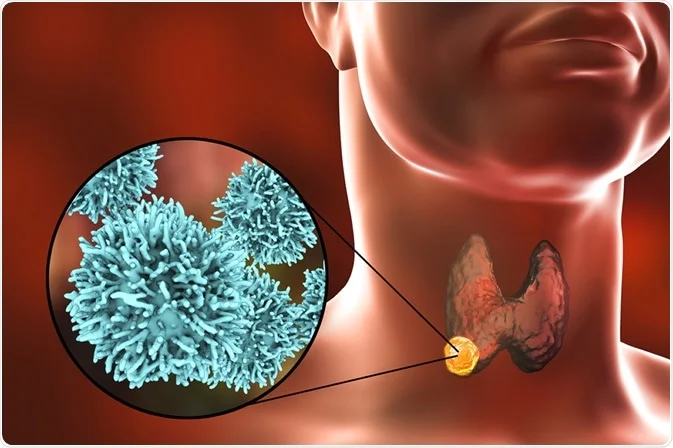Genetic testing for thyroid cancer

If you tested your DNA with a personal genomics service like 23andMe, AncestryDNA, FamilyTreeDNA, MyHeritage or another testing company, you can learn more about your risk factors for hundreds of diseases. By clicking the button above ⬆️, you can upload your raw DNA data file and receive a personalized 250-page health report with research links that is the most comprehensive.
Thyroid cancer is a prevalent type of malignancy in the endocrine system. Children who undergo radiation therapy for leukemia or lymphoma are at a higher risk of developing thyroid cancer due to low-dose radiation exposure during their childhood. Various factors can contribute to the development of ThyCa, including genetic mutations, iodine consumption, TSH levels, autoimmune thyroid disorders, estrogen, obesity, lifestyle modifications, and environmental pollutants.
Point mutations are commonly detected in the three RAS genes in thyroid cancers, with NRAS being the most frequently affected. Papillary thyroid carcinoma exhibits RAS mutations in 10-20% of cases, while poorly differentiated thyroid cancers show RAS mutations in 25% of cases. The follicular variant of papillary thyroid carcinoma is typically associated with RAS-mutated tumors. Additionally, RAS mutations are observed in 20-40% of follicular adenomas (Wells et al., 2013). In sporadic medullary thyroid carcinoma without RET mutation, RAS mutations, primarily HRAS, KRAS, and NRAS, are found in 68% of cases.
The BRAF gene encodes a protein that facilitates the transfer of chemical signals from the extracellular environment to the nucleus. This protein is a crucial component of the RAS/MAPK signaling pathway, which regulates various essential cellular processes. BRAF point mutation is detected in around 45% of papillary thyroid cancers (PTC) and is less common in poorly differentiated and anaplastic thyroid cancers.
CTNNB1 (also known as β-catenin) and TP53 are two crucial genes that undergo mutations during thyroid tumorigenesis. CTNNB1 plays a role in Wnt signaling, while TP53 acts as a tumor suppressor. These mutations are predominantly observed in poorly differentiated and anaplastic thyroid cancer, with TP53 mutations potentially contributing to the de-differentiation of these tumors (Garcia-Rostan et al., 2001; Dobashi et al., 1994).
Between 40% and 60% of benign hyperfunctioning adenomas exhibit mutations in TSHR (thyroid stimulating hormone receptor). Additionally, activating mutations of TSHR have been detected in hyperfunctioning follicular carcinomas that are rare but have high radioiodine uptake and thyrotoxicosis. The involvement of TSHR in the development of certain hypofunctioning thyroid tumors remains uncertain (Donghi et al., 1993).
Specific point mutations at codons 201 and 227 can activate the gene for the alpha polypeptide chain (αs) of the heterotrimeric G protein Gs, transforming it into the putative oncogene gsp. These mutations have been observed in 40% of human growth hormone-secreting pituitary adenomas and in a solitary autonomously functioning thyroid adenoma. Nevertheless, the precise function of this mutation in thyroid tumors remains uncertain.
Follow the link of the selected polymorphism to read a brief description of how the selected polymorphism affects Cancer of the thyroid gland and see a list of existing studies.
SNP polymorphisms related to the topic Cancer of the thyroid gland:
| rs966423 | The rs966423 polymorphism in DIRC3 is associated with papillary thyroid carcinoma. |
| rs2439302 | The rs2439302 polymorphism is associated with thyroid cancer. |
| rs944289 | The FOXE1 locus is a major genetic determinant of radiation-dependent thyroid cancer. |
| rs6983267 | SNP on chromosome 8q24 associated with increased risk of prostate cancer and colorectal cancer amenable to aspirin. |
| rs1800860 | RET tagSNP polymorphism is associated with clinical severity and thyroid function in patients with differentiated thyroid cancer. |
| rs1800858 | RET signalling pathway initiator polymorphisms are associated with susceptibility to sporadic papillary thyroid carcinoma. |
| rs965513 | Genetic predisposition to familial non-medullary thyroid cancer. |
| rs2961920 | Breakdown associated with papillary thyroid cancer, which is the most common form of thyroid cancer and is well-treated. |
| rs199752932 | |
| rs9282834 | |
| rs17158558 | |
| rs116909374 | |
| rs1867277 | |
| rs2910164 | |
| rs1443434 | |
About The Author
Li DaliLi Dali, a National Foundation for Outstanding Youth Fund recipient, is a researcher at the School of Life Sciences in East China Normal University. He earned his PhD in genetics from Hunan Normal University in 2007 and conducted collaborative research at Texas A&M University during his doctoral studies. Li Dali and his team have optimized and innovated gene editing technology, leading to the establishment of a world-class system for constructing gene editing disease models.


